- Home
- Michael Bond
Paddington Takes the Test
Paddington Takes the Test Read online
CONTENTS
1. Paddington at the Wheel
2. In And Out of Trouble
3. Paddington and the Stately Home
4. Paddington and “Bob-a-Job”
5. Paddington Gets a Rise
6. Mr. Curry Lets Off Steam
7. Pantomime Time
Back Ad
Books by Michael Bond
Credits
Copyright
About the Publisher
Chapter One
PADDINGTON AT THE WHEEL
Paddington gave the man facing him one of his hardest stares ever. “I’ve won a bookmark!” he exclaimed hotly. “But I thought it was going to be a Rolls-Royce.”
The man fingered his collar nervously. “There must be some mistake,” he replied. “The lucky winner of the car has already been presented with it. And the second prize, a weekend for two in Paris, has gone to an old-age pensioner in Edinburgh. If you’ve had a letter from us, then you must be one of the ten thousand runners-up who merely receive bookmarks. I can’t think why one wasn’t enclosed.”
“I’m one of ten thousand runners-up?” repeated Paddington, hardly able to believe his ears.
“I’m afraid so.” Regaining his confidence, the man began rummaging in one of his desk drawers. “The trouble is,” he said meaningly, “so many entrants to competitions don’t bother to read the small print. If you care to take another look at our entry form, you’ll see what I mean.”
Paddington took the leaflet and focused his gaze on a picture of a large, sleek, silver-gray car. A chauffeur, standing beside one of the open doors, was flicking an imaginary speck of dust from the upholstery with one of his gloves, while across the bonnet, in large red letters, were the words ALL THIS COULD BE YOURS!
Having slept with an identical picture under his pillow at Number thirty-two Windsor Gardens for several weeks, Paddington felt he knew it all by heart. He turned it over, and on the back were the same instructions for entering the competition, together with an entry form.
“Now look inside,” suggested the man.
Paddington did as he was told, and as he did so, his face fell. He’d been so excited by the picture of the Rolls-Royce he hadn’t bothered to look any farther, but as he pulled the pages apart, he found it opened out into a larger sheet. On the left-hand side there was a picture of a French gendarme pointing towards a distant view of the Eiffel Tower, and on the right, under the heading TEN THOUSAND CONSOLATION PRIZES TO BE WON, there was a picture of a bookmark, followed by a lot of writing.
By the end of the page some of the print was so small Paddington began to wish he’d brought his opera glasses with him, but there was no escaping the fact that the bookmark had an all-too-familiar look about it. One exactly like it had arrived that very morning in the envelope containing news of his success.
“I don’t think a bookmark is much consolation for not winning a Rolls-Royce!” he exclaimed. “I put mine down the waste disposal. I didn’t think it was a prize.”
“Oh, dear!” The man gave a sympathetic cluck as he riffled through a pile of papers on his desk to show the interview was at an end. “How very unfortunate. Still, at least you’ve had the benefit of eating some of our sun-kissed currants.” He opened one of his desk drawers again and took out a packet. “Have some more as a present,” he said.
“But I don’t even like currants!” exclaimed Paddington bitterly. “And I ate fifteen boxes of them!”
“Fifteen?” The man gazed at Paddington with new respect. “May I ask what your slogan was?”
“A currant a day,” said Paddington hopefully, “keeps the doctor away.”
“In that case,” said the man, permitting himself a smile, “you shouldn’t require any medical attention for quite a . . .” His voice trailed away as he caught sight of the look Paddington was giving him.
It had taken Paddington a long time to get through fifteen boxes of currants, not to mention think up a suitable slogan into the bargain. And, if the expression on his face was anything to go by, the whole thing had left him in need of more medical attention rather than less.
In fact, as he made his way back down the stairs, Paddington began to look more and more gloomy. The news that he wasn’t after all the proud possessor of a gleaming new motorcar was a bitter blow, one made all the worse because he hadn’t even wanted it for himself—it had really been intended as a surprise for Mr. Brown.
Mr. Brown’s present car was a bit of a sore point in the Brown household. The general feeling at Number thirty-two Windsor Gardens was that it ought to have been pensioned off years ago. But Mr. Brown had held on to it because it was hard to find anything large enough to convey the whole of the family, not to mention Paddington and all his belongings, when they went on their outings.
Apart from its age it had a number of drawbacks, one of which was that instead of flashing lights, it relied on illuminated arms to indicate intended changes of direction. It was the failure of one of these arms, when Mr. Brown had been turning into a main road one day, that had attracted the attention of a passing policeman who’d taken his number.
Paddington had been most upset at the time because he’d been sitting alongside Mr. Brown, ready to help out with paw signals when necessary.
The magistrate had had one or two pointed things to say about drivers who relied on bears for their signals, and much to Mr. Brown’s disgust he’d been ordered to retake his driving test.
It was shortly after this disastrous event that Paddington had come across a leaflet in the local supermarket announcing a competition in which the first prize was a car. And it was not just any old car, but a Rolls-Royce. Paddington felt sure that with a car as grand as a Rolls, Mr. Brown couldn’t possibly fail his coming test, let alone have any motoring problems ever again.
The competition was sponsored by a well-known brand of currants, and the lady in the supermarket assured Paddington that there had been nothing like it in the dried-fruit world before. When he consulted the leaflet with the aid of his torch under the bedclothes that night, he could quite see what she meant, for it couldn’t have been more simple. All that was required was a suitable slogan to do with currants, together with three packet tops to show that the entry was genuine.
But the thing which really clinched matters for Paddington was the discovery that not only was the result of the competition being announced on the same day that Mr. Brown was due to take his test, but that the firm who were running it occupied a building in the very same street as the Test Center.
Paddington was a great believer in coincidences. Some of his best adventures had come about in just such a way—almost as if they had been meant to happen—and after buying some extra packets of currants in order to make doubly sure of success, he lost no time in sending off his entry.
The fact that in the end it had all come to naught was most disappointing, and as he left the building, he paused in order to direct a few more hard stares in the direction of the upper floors. Then he collected his shopping basket on wheels from the car park outside and made his way slowly along the road towards the Test Center.
He was much earlier than he had expected to be and so he wasn’t too surprised to find Mr. Brown’s car still standing where it had been parked earlier that morning. Neither Mr. Brown nor Mrs. Brown was anywhere in sight, and being the sort of bear who didn’t believe in wasting time, Paddington parked his shopping basket on wheels alongside it. Then he climbed into the driver’s seat and switched on the radio while he awaited developments.
Like the car itself, Mr. Brown’s radio had seen better days. It somehow managed to make everything sound the same, rather like an old-fashioned horn gramophone, and in no time at all Paddington foun
d himself starting to nod off. His eyelids got heavier and heavier, and soon the sound of gentle snoring added itself to the music.
Paddington had no idea how long he slept, but he was just in the middle of a very vivid dream in which he was driving down a long road, battling against a storm of currants as big as hailstones, when he woke with a start and found to his surprise that two men were standing outside the car peering through the window at him. One of them was carrying a large clipboard to which was attached a sheaf of very important-looking papers, and he was tapping on the glass in no uncertain manner.
Paddington hastily removed his paws from the steering wheel and opened the driver’s door.
“Is your name Brown?” demanded the man with the clipboard, trying to make himself heard above the radio. “From Number thirty-two Windsor Gardens?”
“That’s right,” said Paddington, looking most surprised.
“Hmm.” The man gave him an odd look and then consulted the papers on his board. “Er . . . I take it you are a British subject?” he asked.
Paddington considered the matter for a moment. “Well,” he said, “yes and no . . .”
“Yes and no?” repeated the man sharply. “You can’t be yes and no. You must be one thing or the other.”
“I live at Number thirty-two Windsor Gardens,” said Paddington firmly, “but I come from Darkest Peru.”
“Darkest Peru? Oh!” The man began to look as if he rather wished he hadn’t brought the matter up. Hastily changing the subject, he motioned with his free hand towards his companion. “I take it you won’t mind if we’re accompanied?” he asked. Then, lowering his voice, he gave Paddington a knowing wink. “We instructors have to be tested every now and again as well, you know. It’s my turn today.”
“I didn’t know,” said Paddington with interest. “Perhaps I could ask you some questions on the Highway Code. I’ve been testing the others at breakfast all this week.”
The examiner glared at him. “No you can’t!” he snorted above the sound of martial music from the radio. He looked as if he would have liked to say a good deal more, but instead he recovered himself and opened the rear door of the car for his superior to enter.
“Colonel Bogey,” said the other man briefly, nodding towards the front of the car as he settled himself in the backseat.
Paddington raised his hat politely as the examiner made his way round the front of the car and climbed into the passenger seat. “Good morning, Mr. Bogey,” he said.
The man clucked impatiently. He was about to explain that his superior had only been giving the name of the tune on the radio, not an introduction, but he thought better of it. Instead, he reached forwards for the switch. “I think we’ll have the radio off for a start,” he said severely. “I can’t concentrate properly with that row on, and I’m sure you can’t eith . . .” He broke off, and a strange look came over his face as he felt the seat. “I’m sitting on something,” he cried. “Something wet and sticky!”
“Oh, dear,” said Paddington, looking most upset. “I expect that’s my marmalade sandwiches. I put them there for my elevenses.”
“Your marmalade sandwiches?” repeated the man as if in a dream. “They’re all over my new trousers.”
“Don’t worry,” said Paddington. He lifted up his hat and withdrew a small package. “I’ve got some more. I always keep some under my hat in case of an emergency.”
The examiner’s face seemed to go a funny color. But before he had a chance to open his mouth, the man in the back reached over and tapped him on the shoulder. “Don’t you think we ought to get cracking,” he said meaningly. “Time’s getting on, and we’ve a lot to get through.”
The examiner took a deep breath as he gathered himself together. “I take it,” he said between his teeth, “you hold a current license?”
“A currant license?” It was Paddington’s turn to look taken aback. He’d never heard of anyone needing a license just to eat currants before. “I don’t think Mrs. Bird would let me be without one,” he said, giving the man a hard stare.
The examiner wilted visibly under Paddington’s gaze. “Perhaps you would like to switch the engine on?” he said hastily. “We, of the Department of Transport,” he continued, in an attempt to regain his normal icy calm, “do find it easier to conduct our tests actually driving along the road.”
Anxious to make amends, Paddington reached forwards and pushed a nearby button with one of his paws. A grinding noise came from somewhere outside.
The man in the backseat gave a cough. “I think you’ll find that’s the windscreen wiper, Mr. Brown,” he said. “Why don’t you try the button next to it?
“Don’t worry,” he continued, raising his voice as Paddington did as he was asked and the engine suddenly roared into life, “we all get a little nervous at times like these.”
“Oh, I’m not nervous,” said Paddington. “It’s just that they all look the same without my opera glasses.”
“Er, quite!” The examiner gave a high-pitched laugh as he tried to humor his superior by joining in the spirit of things. “Perhaps,” he said, “before we actually set out, we could have a few questions on the Highway Code. Especially,” he added meaningly, “as you say you’ve made such a study of it. What, for instance, do we look out for when we’re driving at this time of the year?”
Paddington put on his thoughtful expression. “Strawberries?” he suggested, licking his lips.
“Strawberries?” repeated the examiner. “What do you mean—strawberries?”
“We often stop for strawberries at this time of the year,” said Paddington firmly. “Mrs. Bird makes some special cream to go with them.”
“I would hardly call strawberries a hazard,” said the examiner petulantly.
“They are if you eat them going along,” said Paddington firmly. “It’s a job to know what to do with the stalks—especially if the ashtray’s full.”
“Good point,” said the man in the back approvingly. “I must remember that one. So ought you,” he added pointedly, addressing Paddington’s companion.
The examiner took a deep breath. “I was thinking,” he said slowly and carefully, “of sudden showers. If the weather has been dry for any length of time, a sudden shower can make the road surface very slippery.”
Removing a sheet of paper covered with drawings from his clipboard, he decided to have another try. “If you were going along the highway,” he said, pointing to one of the drawings, “and you saw this sign, what would it mean?”
Paddington peered at the drawing. “It looks like someone trying to open an umbrella,” he replied.
The examiner drew in his breath sharply. “That sign,” he said, “happens to mean there are roadworks ahead.”
“Perhaps they’re expecting one of your showers?” suggested Paddington helpfully. He gave the man another stare. For an examiner, he didn’t seem to know very much.
The man returned his gaze as if in a dream. In fact, if looks could have killed, the expression on his face suggested that Paddington’s name would have been added to the list of road casualties with very little bother indeed. However, once again he was saved by an impatient movement from the back of the car.
“Perhaps we should move off now?” said a voice. “We seem to be getting nowhere very fast.”
“Very good.” Taking a firm grip of himself, the examiner settled back in his seat. “Go straight up this road about two hundred meters,” he commanded, “then when you see a sign marked BEAR LEFT . . .”
“A bear’s been left?” Paddington suddenly sat bolt upright. He wasn’t at all sure what was going on, and he’d been trying to decide whether to obey his next set of instructions or wait for Mr. Brown to arrive back. The latest piece of information caused him to make up his mind very quickly indeed.
“I’m afraid I shall have to stand up to drive,” he announced as he clambered to his feet. “I can’t see out properly if I’m sitting down, but I’ll get there as quickly as I can.”
<
br /> “Now, look here,” cried the examiner, a note of panic in his voice. “I didn’t mean there was a real bear lying in the road. I only meant you’re supposed to . . .” He broke off and stared at Paddington with disbelieving eyes. “What are you doing now?” he gasped as Paddington bent down and disappeared beneath the dashboard.
“I’m putting the car into gear,” gasped Paddington as he took hold of the lever firmly with both paws. “I’m afraid it’s a bit difficult with paws.”
“But you can’t change gear with your head under the dashboard,” shrieked the examiner. “No one does that.”
“Bears do,” said Paddington firmly. And he gave the lever another hard tug just to show what he meant.
“Don’t do it!” shouted the examiner. “Don’t do it!”
“Let the clutch out!” came a voice from the backseat. “Let the clutch out!”
But if either of the men expected their cries to have any effect, they were doomed to disappointment. Once Paddington got an idea firmly fixed in his mind it was very difficult to get him to change course, let alone gear, and apart from hurriedly opening the car door to let out the clutch, he concentrated all his energies on the task in hand.
In the past he had often watched Mr. Brown change gear. It was something Mr. Brown prided himself on being able to do very smoothly indeed, so that really it was quite hard to know when it had actually taken place. But if Paddington hoped to emulate his example, he failed miserably. As he gave the lever one final, desperate shove, there was a loud grinding noise followed almost immediately by an enormous jerk as the car leaped into the air like a frustrated stallion. The force of the movement caused Paddington to fall over on his back, and, in his excitement, he grabbed hold of the nearest thing to hand.
“Look out!” shrieked the examiner.
But he was too late. As Paddington tightened his grip on the accelerator pedal, the car shot forwards with a roar like an express train. For a second or two it seemed to hover in midair, and then, with a crash which made the silence that followed all the more ominous, it came to a halt again.

 Paddington on Top
Paddington on Top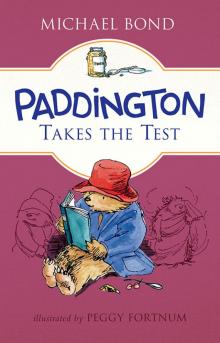 Paddington Takes the Test
Paddington Takes the Test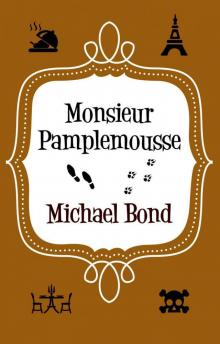 Monsieur Pamplemousse (Monsieur Pamplemousse Series)
Monsieur Pamplemousse (Monsieur Pamplemousse Series)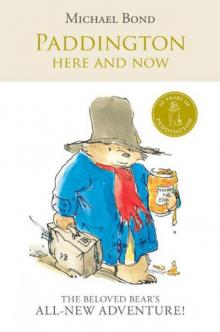 Paddington Here and Now
Paddington Here and Now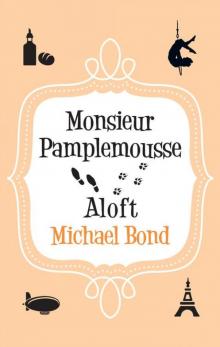 Monsieur Pamplemousse Aloft
Monsieur Pamplemousse Aloft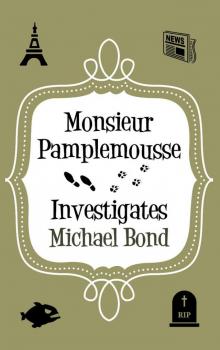 Monsieur Pamplemousse Investigates
Monsieur Pamplemousse Investigates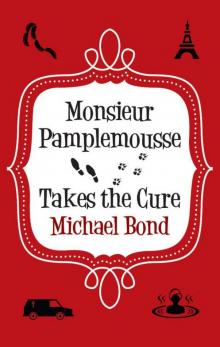 Monsieur Pamplemousse Takes the Cure
Monsieur Pamplemousse Takes the Cure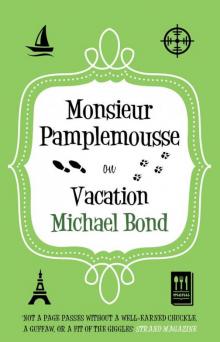 Monsieur Pamplemousse on Vacation
Monsieur Pamplemousse on Vacation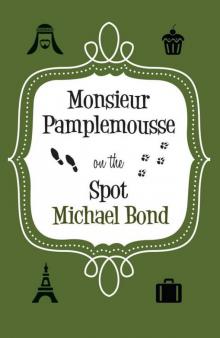 Monsieur Pamplemousse on the Spot
Monsieur Pamplemousse on the Spot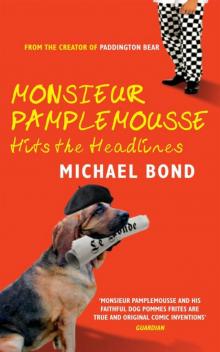 Monsieur Pamplemousse Hits the Headlines
Monsieur Pamplemousse Hits the Headlines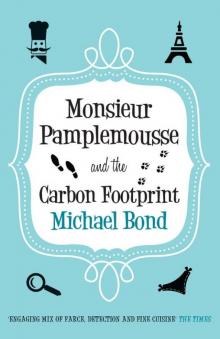 Monsieur Pamplemousse and the Carbon Footprint
Monsieur Pamplemousse and the Carbon Footprint Love from Paddington
Love from Paddington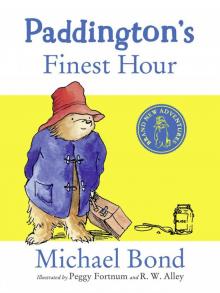 Paddington’s Finest Hour
Paddington’s Finest Hour Paddington Complete Novels
Paddington Complete Novels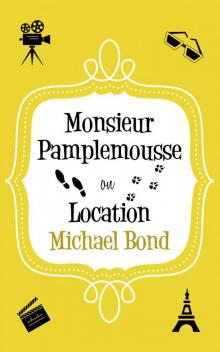 Monsieur Pamplemousse On Location
Monsieur Pamplemousse On Location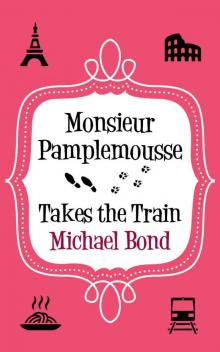 Monsieur Pamplemousse Takes the Train
Monsieur Pamplemousse Takes the Train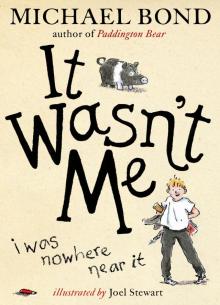 It Wasn’t Me!
It Wasn’t Me! Paddington Races Ahead
Paddington Races Ahead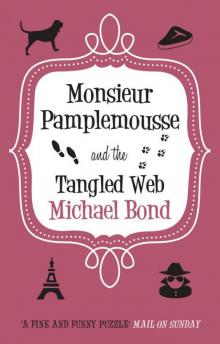 Monsieur Pamplemousse and the Tangled Web
Monsieur Pamplemousse and the Tangled Web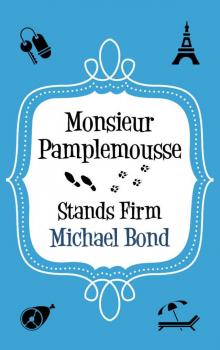 Monsieur Pamplemousse Stands Firm
Monsieur Pamplemousse Stands Firm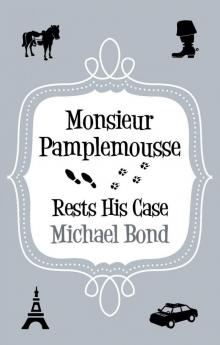 Monsieur Pamplemousse Rests His Case
Monsieur Pamplemousse Rests His Case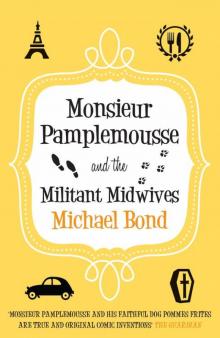 Monsieur Pamplemousse and the Militant Midwives
Monsieur Pamplemousse and the Militant Midwives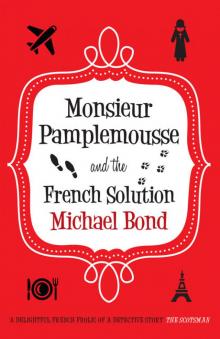 Monsieur Pamplemousse and the French Solution
Monsieur Pamplemousse and the French Solution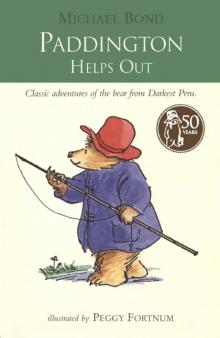 Paddington Helps Out
Paddington Helps Out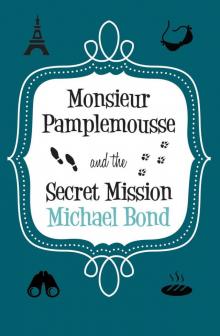 Monsieur Pamplemousse & the Secret Mission (Monsieur Pamplemousse Series)
Monsieur Pamplemousse & the Secret Mission (Monsieur Pamplemousse Series)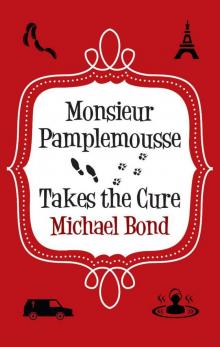 Monsieur Pamplemousse Takes the Cure (Monsieur Pamplemousse Series)
Monsieur Pamplemousse Takes the Cure (Monsieur Pamplemousse Series) A Bear Called Paddington
A Bear Called Paddington